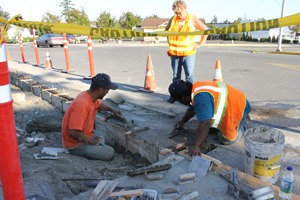Big plans loom for Friday Harbor, if the town council response to Administrator Duncan Wilson at the all-day council retreat is any indication.
On Saturday, Wilson made what amounted to a “state of the town” presentation to Mayor Carrie Lacher and the council, complete with a long list of current projects and a plan for the future repair and renovation of many city streets.
The highlight is a proposal in which the council would create a Transportation Benefit District for the Town of Friday Harbor, which could include a two-tenths of one percent sales tax hike to partially fund up to $15 million in street projects.
The “major projects list” for completion this year includes fourteen construction projects and three design and planning projects, costing over $3.5 million.
“The current revenue will maintain town services,” Wilson said, “but there’s not enough income to maintain the streets.”
The sales tax increase will provide $220,000 per year to start, increasing gradually over 10 years, when the tax will either expire or be renewed by voters to fund more projects.
The most expensive: Blair Street Reconstruction and Sidewalks, $1.5 million (90 percent paid by a Transportation Improvement Board grant); water and sewer line replacement on Spring Street, between First and Front, $210,000; water and sewer line replacement on Spring Street between Second and Argyle, $140,000; Street and Park Department buildings, $600,000; and the Linder/Nelson/Franck/Nichols streets stormwater project, $450,000.
These projects are in the current budget and underway, but the long list of deteriorated or substandard streets that need repair or reconstruction will need funds from several sources – including money squirreled away in the town coffers and some form of tax increase to provide seed money and matching funds necessary to attract state and federal grants, according to Wilson.
Wilson helped North Bend, Wash., create a TBD in 2011, funded by the statutory sales tax of 20 cents per $100 of spending. Before the meeting, Wilson said the council had discussed the idea informally more than once, with Councilman Steve Hushebeck an early proponent.
Transportation Benefit Districts are separate taxing districts for defined local jurisdictions, usually municipalities but sometimes counties. Under state law, any tax increase proposed by a TBD must be approved by local voters and can be used only for transportation improvements.
Friday Harbor has almost the lowest sales tax rate in the state, Wilson said.
“The small increase the council will ask the voters to approve will be paid for by people who use the town’s streets, in part by tourists and county residents who shop in Friday Harbor. This tax will directly benefit Friday Harbor voters in many ways.”
To illustrate the need, town Director of Public Works Wayne Haefele talked about street construction and maintenance, and reviewed findings of street inspections with dozens of photographs illustrating problems streets and neighborhoods.
“Together with the monies we allocate annually in the budget, the TBD would be the start of funding the needed repairs,” Wilson said.
Saying the initial estimate of repair and maintenance costs was in the $8 to $10 million range, Wilson noted that more detailed inspections and engineering showed that up to $15 million would be needed to rehabilitate the entire town street grid.
“We’ve got to be honest with the people when we tell them what future costs will be,” he said.
Council reactions were positive. Councilman Hushebeck said, “We should absolutely be for it. I’m really impressed with improvements we’ve already made and this project is the capstone to everything going on.”
Councilman Neil Monin said street maintenance problems “have been accelerating in Friday Harbor and won’t just go away, we need something like this.”
Councilwoman Barbara Starr wants to make sure that neighborhoods would understand the benefits they would receive.
“We’ve got to focus our outreach to residents,” she said.
Newly elected Councilman Farhad Ghatan summed up the discussion: “Let’s move forward on this.”
Creation of the transportation district will be on an early Town Council meeting agenda, Lacher said, to be followed within weeks by the necessary approval to put the sales tax increase on the November ballot.




